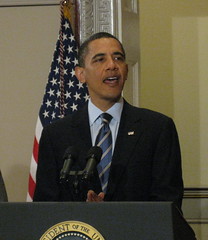Thursday
Jun112009
Pelosi Supports President's Pay-As-You-Go Method
By Courtney Ann Jackson-Talk Radio News Service
The acceleration of President Obama's pay-as-you-go initiative, a method that would require Congress to use current revenues for capital items instead of borrowing funds by issuing bonds, and health care reform are important steps in turning the economy around, according to U.S. Speaker of the House Nancy Pelosi (D-Calif.). Pelosi and other legislators met with the President earlier this week as he announced the details of the PAYGO initiative.
The U.S. operated under the PAYGO method throughout the 1990’s. Pelosi credited it for leading to the balanced budgets and eventual surplus of the Clinton administration.
“Democrats are coming together around this concept. For many years it has been the central organizing purpose of the blue dogs: fiscal discipline, fiscal responsibility...But I want you to know that there are initiatives from all sectors of our caucus which support pay as you go,” said Pelosi today during a press conference.
Pelosi said she was enthusiastic about “accelerating the (PAYGO) discussion” as a tool to improve the economy and initiate healthcare reform in the U.S.
The Speaker touched upon what kind of healthcare model Congress will pursue.
“It should be administratively self-sufficient. It should be a real competitor with the private sector and not have an unfair advantage. When you say the words public option and that is the term of art we will be using, you have to say right next to it: level playing field.”
She said Congress will soon consider legislation on the supplemental appropriations bill for Iraq, Afghanistan, Pakistan, and pandemic flu. The House will also consider legislation to give the Food and Drug Administration legal authority to regulate how cigarettes and other tobacco products are produced and distributed. Committee work will be focused on the pillars of the President’s agenda which were in the budget. They include: health care, education, energy, reducing the deficit, lowering taxes, creating jobs, and turning the economy around.
The acceleration of President Obama's pay-as-you-go initiative, a method that would require Congress to use current revenues for capital items instead of borrowing funds by issuing bonds, and health care reform are important steps in turning the economy around, according to U.S. Speaker of the House Nancy Pelosi (D-Calif.). Pelosi and other legislators met with the President earlier this week as he announced the details of the PAYGO initiative.
The U.S. operated under the PAYGO method throughout the 1990’s. Pelosi credited it for leading to the balanced budgets and eventual surplus of the Clinton administration.
“Democrats are coming together around this concept. For many years it has been the central organizing purpose of the blue dogs: fiscal discipline, fiscal responsibility...But I want you to know that there are initiatives from all sectors of our caucus which support pay as you go,” said Pelosi today during a press conference.
Pelosi said she was enthusiastic about “accelerating the (PAYGO) discussion” as a tool to improve the economy and initiate healthcare reform in the U.S.
The Speaker touched upon what kind of healthcare model Congress will pursue.
“It should be administratively self-sufficient. It should be a real competitor with the private sector and not have an unfair advantage. When you say the words public option and that is the term of art we will be using, you have to say right next to it: level playing field.”
She said Congress will soon consider legislation on the supplemental appropriations bill for Iraq, Afghanistan, Pakistan, and pandemic flu. The House will also consider legislation to give the Food and Drug Administration legal authority to regulate how cigarettes and other tobacco products are produced and distributed. Committee work will be focused on the pillars of the President’s agenda which were in the budget. They include: health care, education, energy, reducing the deficit, lowering taxes, creating jobs, and turning the economy around.
tagged  Congress,
Congress,  Health Care,
Health Care,  Nancy Pelosi,
Nancy Pelosi,  PAYGO,
PAYGO,  economy,
economy,  fda,
fda,  health care reform,
health care reform,  house,
house,  pay-as-you-go,
pay-as-you-go,  pelosi,
pelosi,  senate in
senate in  Congress,
Congress,  News/Commentary
News/Commentary
 Congress,
Congress,  Health Care,
Health Care,  Nancy Pelosi,
Nancy Pelosi,  PAYGO,
PAYGO,  economy,
economy,  fda,
fda,  health care reform,
health care reform,  house,
house,  pay-as-you-go,
pay-as-you-go,  pelosi,
pelosi,  senate in
senate in  Congress,
Congress,  News/Commentary
News/Commentary 






Solis Sees Health Care Reform As Possible Solution To Job Crisis
Hilda Solis, Department of Labor Secretary, gave remarks today on health care reform, at the American Federation for Teachers, Health Care and Public Employees Joint Conference.
“We’re in a lot of trouble...[there are] things that weren’t taken care of years ago and its catching up to us now... We can downsize in a way that doesn’t hurt the most vulnerable and to me that means health care,” said Solis.
Solis stressed that there are over 250 million jobs in health care careers that can be filled by unemployed Americans. She also emphasized that newly displaced workers can take advantage of the 3.5 billion dollars that have been released by the Department of Labor for green collar jobs by partaking in new training programs.
“Health care isn't a one time shot. Health care reform is a tough issue for us, and for the President, and for many Americans. [There are] 46 million, and growing, that don’t have it,’ said Solis. “There are more people having to go to public assistance because they lost their job...we've got to fix it.”